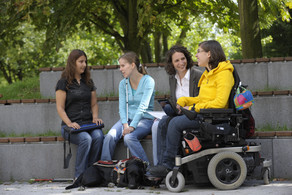Rundmail - Umgang mit ChatGPT in der Lehre

Please find the English version below.
Liebe Lehrende,
angesichts der zahlreichen Fragen, die seit der öffentlichen Debatte um ChatGPT entstanden sind, möchte die TU Dortmund ihren Mitarbeitenden und Studierenden eine erste Orientierungshilfe für die Lehre zur Verfügung stellen. Mit dieser E-Mail informieren wir Sie über eine erste Handreichung sowie Workshop-Angebote im Mai.
Erste Handreichung
Um neben den Herausforderungen und Grenzen auch auf die Chancen und Potenziale KI-gestützter Schreibwerkzeuge wie ChatGPT aufmerksam zu machen und für den verantwortungsvollen, kritisch-reflektierten Umgang damit in Lehre und Studium zu sensibilisieren, hat das Prorektorat Studium gemeinsam mit dem Zentrum für HochschulBildung (zhb) und dem Dezernat Studierendenservice eine erste Handreichung zum Umgang mit ChatGPT und anderen generativen KI-gestützten Schreibwerkzeugen in der Lehre erarbeitet.
Sie finden die erste Handreichung im Portal Digitale Lehre der TU Dortmund. Die Informationen dort werden laufend aktualisiert.
Neben einer kurzen Erklärung, wie ChatGPT funktioniert, werden in der Handreichung Fragen der Relevanz solcher Tools für die Hochschullehre adressiert: Warum gibt es so viel Aufmerksamkeit für KI-gestützte Schreibwerkzeuge? Was kann ChatGPT derzeit im Kontext universitärer Prüfungsnachweise leisten (und was nicht)? Warum ist es nicht zielführend, ChatGPT in der Lehre zu verbieten? Rechtliche Aspekte im Prüfungswesen (Urheberschaft, Regelungsbedarf und Kennzeichnungspflicht) sind ebenso Gegenstand der ersten Handreichung wie die didaktischen Möglichkeiten mit KI-gestützten Tools – insbesondere hinsichtlich schriftlicher Prüfungsformen. Ferner sind Ansprechpersonen an der TU Dortmund benannt, an die Sie sich mit weiteren Fragen wenden können. Die Handreichung ist auch für Studierende der TU Dortmund zugänglich. Per Rundmail haben wir sie darüber informiert, dass konkrete Lehrformate und Regelungen gegenwärtig erarbeitet werden.
Hochschuldidaktisches Workshop-Angebot „KI-Tools und ChatGPT: Die eigene Lehre neu denken!“
Im Mai bietet der Bereich Hochschuldidaktik zwei Termine zu dem Workshop „KI-Tools und ChatGPT: Die eigene Lehre neu denken!“ an. Ziel ist es, die Wirkung von KI-Tools und insbesondere KI-basierter Texttools auf die eigene Lehre einschätzen und Handlungsstrategien für den Umgang in der eigenen Lehre entwickeln zu können.
Der Workshop richtet sich an alle Lehrenden der TU Dortmund, umfasst zehn Arbeitseinheiten und findet digital statt. Weitere Informationen sowie die Möglichkeit zur Anmeldung finden Sie im Workshop-Portal des Bereichs Hochschuldidaktik.
Ein schöner Gruß
Wiebke Möhring
Prorektorin Studium
P.S.: Diese Mail wurde an alle Hochschullehrenden (inkl. Vertretungsprofessor*innen), Junior-Professor*innen, wissenschaftlichen Mitarbeiter*innen, wissenschaftlichen Beamten und Lehrbeauftragten verschickt. Gerne können Sie sie darüber hinaus an Personen aus Ihrem eigenen Umfeld weiterleiten, für die diese Informationen relevant sind.
_________________________
Dear teachers,
in view of the numerous questions that have arisen since the public debate about ChatGPT, TU Dortmund University would like to provide its staff and its students with an initial orientation guide for teaching. With this email we inform you about an initial orientation guide and workshop offers in May.
Initial orientation guide for teaching
In order to draw attention to the challenges and limitations as well as the opportunities and potentials of AI-assisted writing tools such as ChatGPT, and to raise awareness of the responsible, critically-reflective use of them in teaching and studying, the Vice President Academic Affairs, together with the Center for Higher Education (zhb) and the Corporate Center Student Services, has developed an initial orientation guide on the use of ChatGPT and other generative AI-assisted writing tools in teaching.
You can find the orientation guide on the Digital Teaching website of TU Dortmund University. The information there will be updated continuously.
In addition to a brief explanation of how ChatGPT works, the initial orientation guide addresses questions about the relevance of such tools for academic teaching: Why is there so much attention on AI-assisted writing tools? What can ChatGPT currently do (and not do) in the context of university examinations? Why is it not purposeful to ban ChatGPT in academic teaching? Legal aspects of auditing (authorship, need for regulation, and labeling requirements) are as much the subject of the initial orientation guide as the didactic possibilities with AI-assisted tools – especially with regard to written forms of examination. Furthermore, contact persons at TU Dortmund University are indicated; please turn to them in case of further questions. The initial orientation guide is also available for students of TU Dortmund University. We have informed them by email that concrete teaching formats and regulations are currently being developed.
Higher Education Didactics Workshop "AI Tools and ChatGPT: Rethinking Your Teaching!"
In May, the Division of Academic Teaching and Faculty Development offers two dates for the workshop "AI-Tools and ChatGPT: Rethinking your own teaching!". The goal is to assess the impact of AI tools and especially AI-based text tools on one's own teaching and to be able to develop action strategies for dealing with them in one's own teaching.
The workshop addresses all teachers at TU Dortmund University, comprises ten work units and takes place digitally. For more information and registration, please visit the workshop website of the Division of Academic Teaching and Faculty Development.
Best regards,
Wiebke Möhring
Vice President Academic Affairs
P.S.: This mail has been sent to all university teachers (incl. substitute professors), junior professors, academic staff, academic officials and lecturers. Please feel free to forward it to persons for whom this information is relevant.




